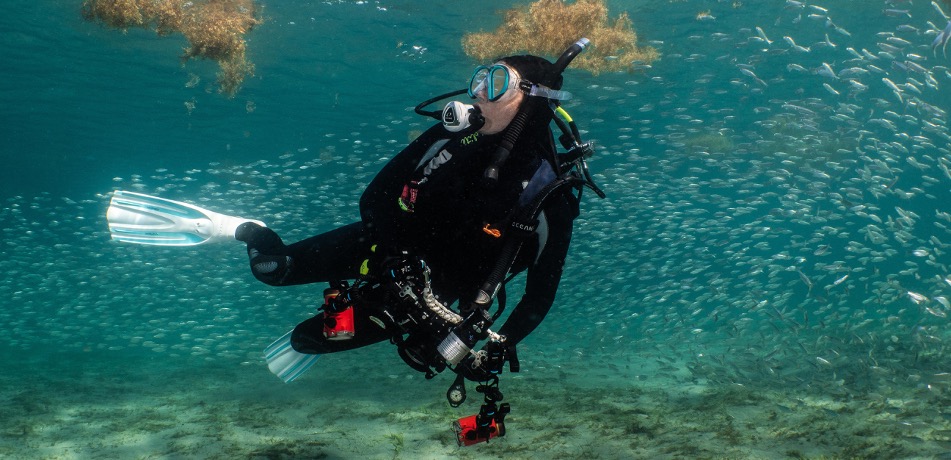
Author: Sam Trail
Date: June 20, 2025
Summertime means it is octopus season here in south Florida! However, our resident octo-specialist, Dr. Chelsea Bennice, spent the month of May somewhere a little colder.
Chelsea was awarded a Whitman Center Fellowship , which supports scientists to conduct research at the Marine Biological Laboratory (MBL) in Woods Hole, Massachusetts for 4-10 weeks. There she focused on learning new research skills. This coveted fellowship allowed her to spend 5 weeks up at the MBL, co-hosted by MBL’s Senior Scientist Roger Hanlon, Ph.D. and Marine Resources Department Director and Veterinarian Lisa Abbo, D.V.M. There she conducted research on establishing octopus health standards. This 5-week research stay was a great start to the project, yet more can be completed. She plans to return and complete the final stages of her project this coming fall.
Although laboratory rental and housing costs were covered by the fellowship, Chelsea was tasked with bringing some lab equipment specific to her project (including syringes, microcentrifuge tubes, sterile swabs, filtration paper, and specialized glassware) along with her. After calling the airline to make sure she could fly with her materials, she packed all of her gear in a checked luggage suitcase and efficiently wrapped breakables in her sweaters for the chilly stay up North! This equipment was imperative for her research project, Octopus health: determining hemolymph values and microbiomes for basic health standards in a laboratory setting. Chelsea explains why it is important to determine health standards for these animals in a lab setting:
“Octopuses have fascinated scientists with their elaborate skin patterns and complex behaviors rivaling those documented in vertebrates. Over the last decade, with recent advancements in technology, cephalopods have taken center stage as a model organism for many fields including physiology, neuroscience, animal behavior, evolutionary development, and biomedical research. However, these animals experience stressors in captive settings and in the wild and reports confirm that bacteria and fungi, as well as viruses and protists, are pathogens affecting captive-reared and wild cephalopods (squids, cuttlefishes, octopuses). With their important role in many scientific study areas, it is critical to understand and implement health standards for octopuses in laboratory settings.”
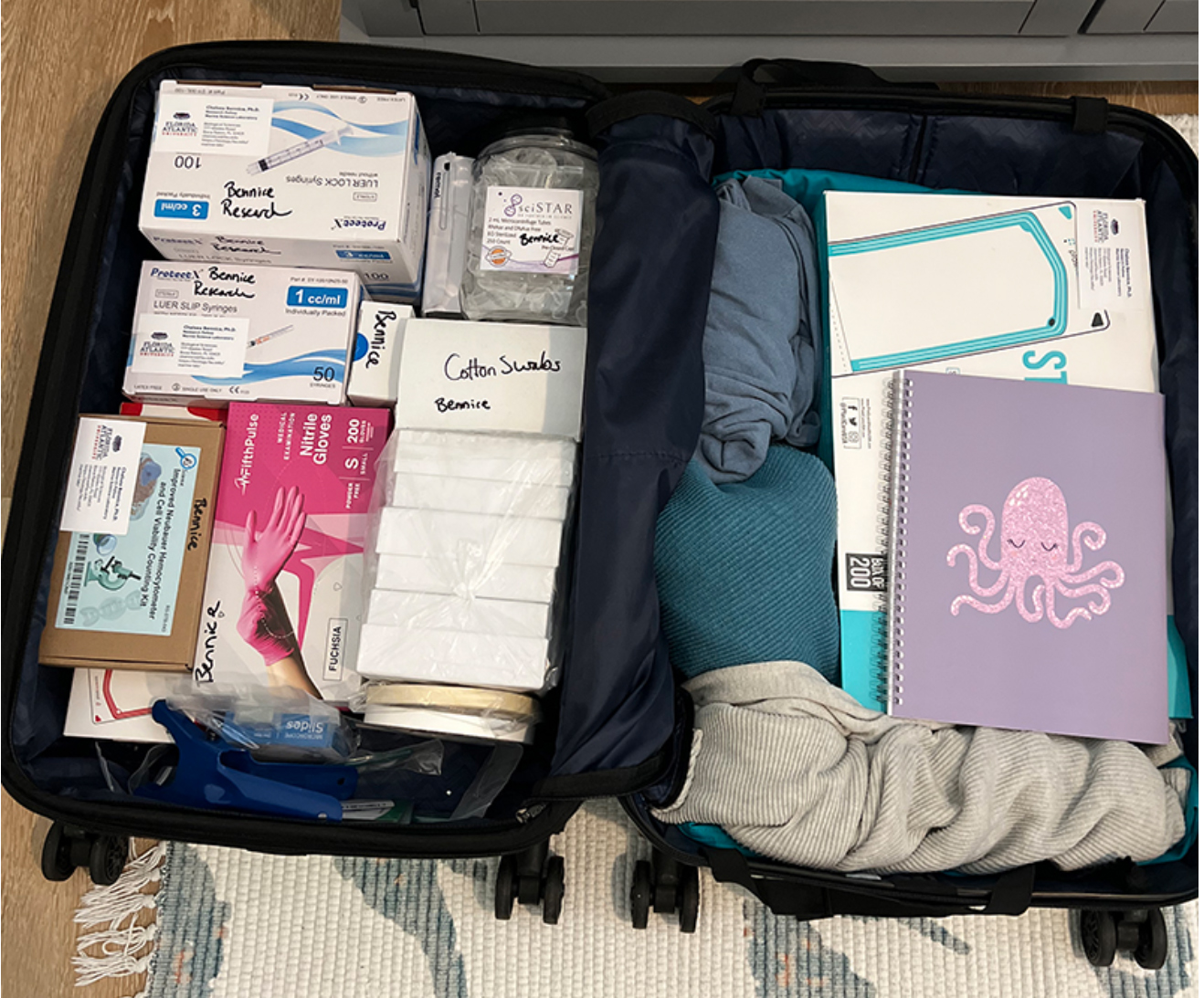
Chelsea’s study aims to be the first of its kind to identify indicators of good health and potential pathogens in the California two-spotted octopus (Octopus bimaculoides) by (1) identifying and characterizing the skin and blood microbiomes, and (2) determining hemolymph (blood) values.
“The first line of defense against opportunistic pathogens is an animal’s skin. Recent research on a few species has reported octopuses to have a unique skin microbiome that potentially harbors symbionts to combat infections. It has also been noted that the amount of bacterial flora on the epidermis of aquarium-housed cephalopods is over 100 times greater than on their wild counterparts. Consequently, aquarium-housed octopuses may be at greater risk of infections from even minor abrasions or damage to the integument,” Chelsea explains.
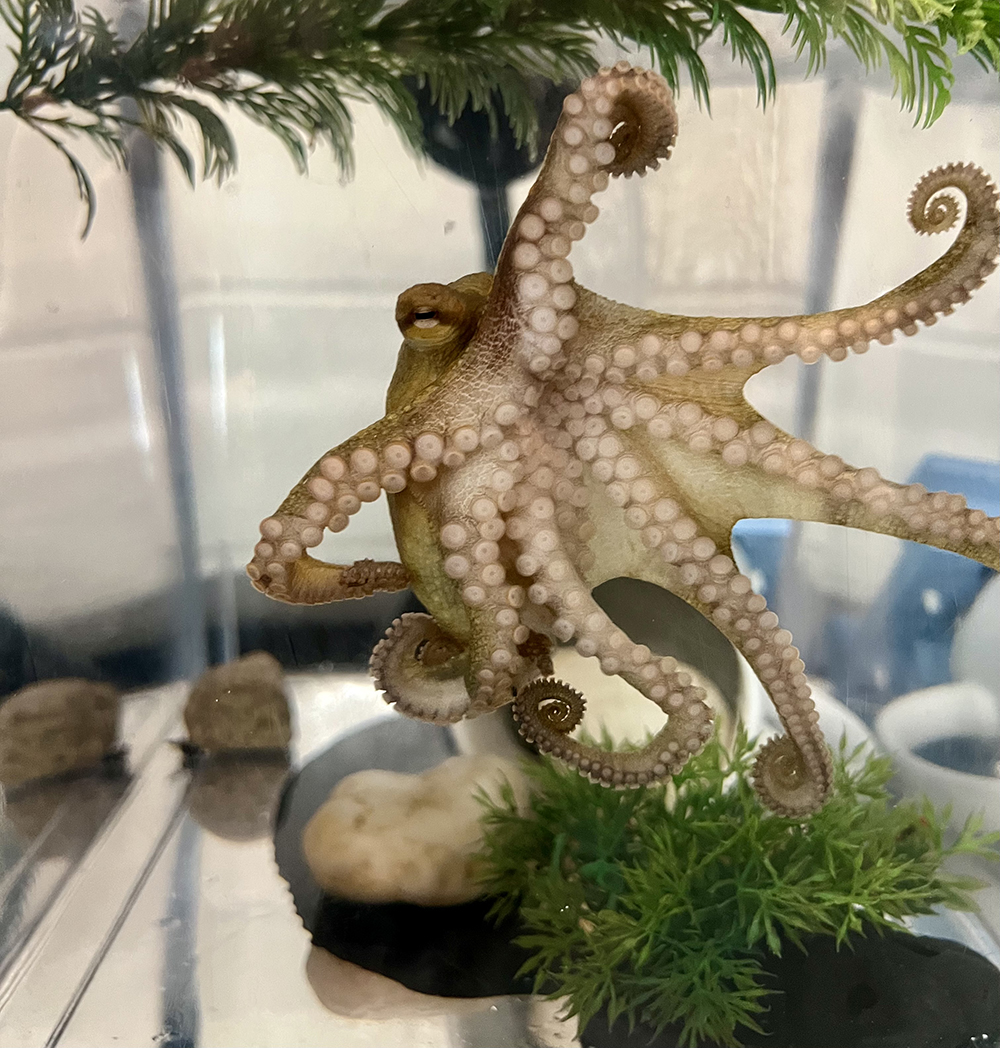
Chelsea is building on the results gleaned from her previous studies designed to identify and characterize the bacterial microbiome on the skin of wild octopuses. She is now taking the next steps. Her first study goal is to measure the presence, absence, and abundance of both skin bacteria and fungi in octopuses housed under laboratory conditions. Her second study goal is to measure and evaluate hemolymph (octopus “blood”) components, such as their hemocyanin levels, which relate to nutritional status in invertebrates like octopuses, and hemocytes (i.e., blood cells), which are the primary component of their immune system. By establishing baseline health parameters for this octopus species, researchers can begin to understand what is the “normal” condition, even when these animals are maintained in a laboratory setting.
So, what did an average day look like for Chelsea while working up at the MBL to establish these baseline health parameters?
Chelsea lived on campus just a few minutes away from the Marine Resources Center building where she conducted her studies. Her scenic commute to work was a brisk walk, coffee in hand, past Eel Pond (once the site of commercial eel fishing, it now houses boats like MBL’s research vessel) to her left and the Atlantic Ocean to her right. It was never a bad way to start the day.
Once in the lab, Chelsea donned her wet lab shoes (A.K.A. rainboots) and prepared to get to work visiting the lab’s 17(!) octopuses.
|
View of the Marine Biological Laboratory across Eel Pond |
After a quick visual assessment of each octopus’s behavior and any skin lesions or wounds, Chelsea would capture the animal, weigh it, and begin collecting, processing, and analyzing microbiome samples. This was a two-step process involving (i) swabbing the octopus’s skin multiple times for microbiome samples (to collect bacteria and fungi), followed by (ii) using an inoculation loop (a tiny science wand with a small loop on the end) containing a microbiome sample from the octopus’ skin to spread the sample onto the surface of a culture plate to check for fungi growth.
She is specifically looking for the fungus Fusarium spp., known to be harmful to marine animals such as sea turtles, sharks, and octopuses. Those steps were followed by obtaining a water sample from the octopus’ home tank so she could compare the microbial environment in the tank to the microbiome sample from the octopus’s skin.
To summarize, Chelsea describes her research methods as “swabbing, swirling, and swooshing!”
Next, with the assistance of the MBL vet, a sample of the octopuses’ blood was collected while animals were under anesthesia. A drop of the sample was viewed under a microscope for total hemocyte (blood cell) counts. The rest of each blood sample was separated for analyzing the blood microbiome and blood chemistry panel. Interestingly, the respiratory pigment in octopus blood is copper-based (hemocyanin) instead of iron-based (hemoglobin) like ours. Because of that, when their clear-ish blood comes into contact with oxygen, surprise! it turns blue!
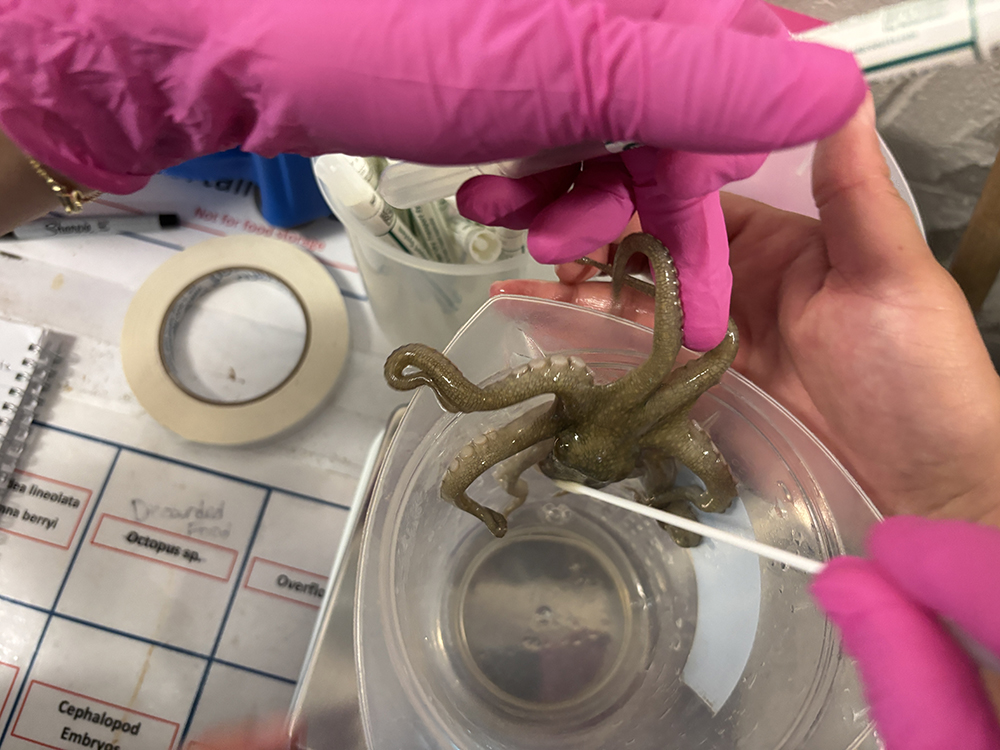
Chelsea even kicked-off the Whitman Fellows Seminar Series presenting highlights and initial results from her project. She will return to the MBL in the fall to complete her projects and is excited to take her new skills into the field! As she explains:
“Octopuses face many environmental stressors that may put their immune systems and microbiomes at risk. Wild octopus populations worldwide have been found to bioaccumulate heavy metals and other toxins. Heavy metals that are waterborne, in the sediment, and in prey animals could be affecting the octopus’ digestive, immune, and neural systems. Such harmful exposure could lead to physiological and behavioral changes for octopuses- a group of animals that serve important predator and prey roles in many marine food webs. As a result, compromised predator/prey interactions could shift ecosystem dynamics.
Although the Woods Hole colder climate is a recent change of pace for Chelsea, it is not an unfamiliar one. She has been here before. Chelsea reflects on this meaningful “full circle” moment in her career:
“My first introduction to cephalopods and marine science research was as an MBL intern in 2009 in Roger Hanlon’s lab working with cuttlefish and squid. My research as a Ph.D. student and beyond continued collaborations with MBL scientists. Sixteen years later, I now return to the MBL as a Whitman Fellow.”
We certainly missed Chelsea while she was away but are thrilled for her to have this unique, well-deserved, opportunity. Her return to the marine lab means she brings a new “toolbox” of scientific skills. Way to go, OctoGirl!
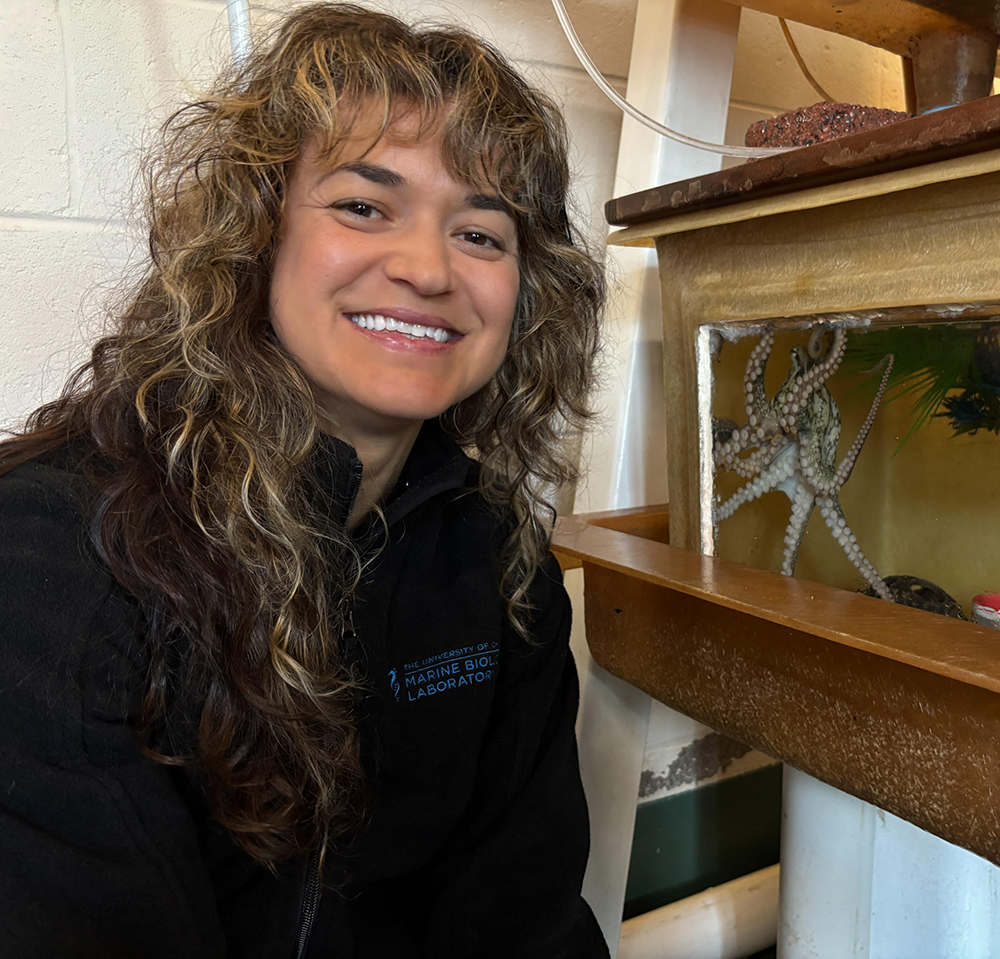
|
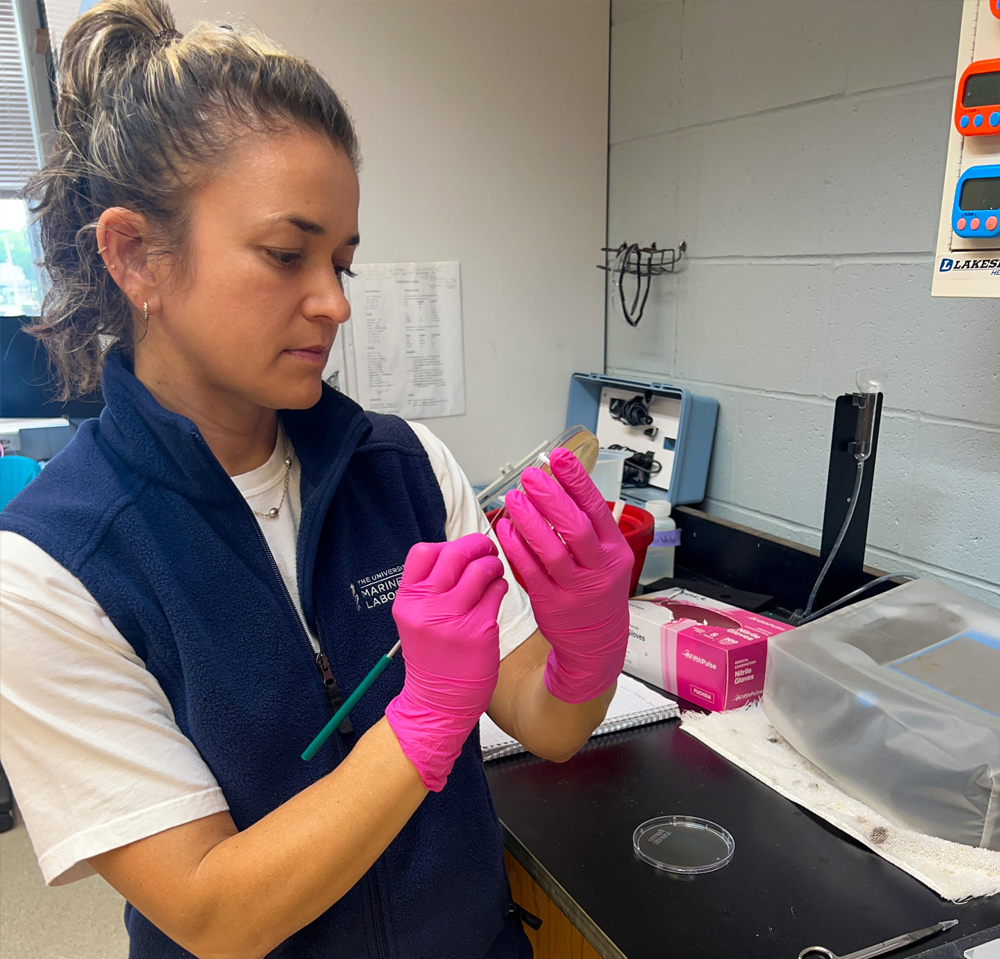
|